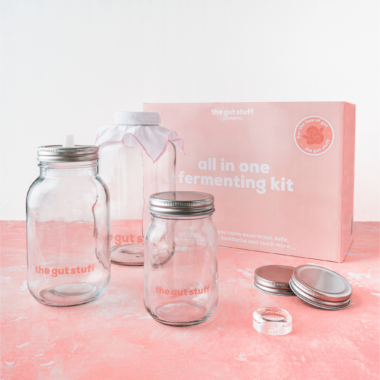Your Gut Health Guide for a Safe Holiday: Preventing Travellers’ Diarrhoea
Our latest guest blog feature is from our friends at Gutfulness Nutrition where we’ve been chatting all things travel and looking after your gut to prevent travellers’ diarrhoea with Marilia Chamon
Written by Marilia Chamon
Foodborne illnesses affect 18 million people in the UK every year and the risk of developing Irritable Bowel Syndrome is 4.2 times higher in individuals exposed to a gastrointestinal infection than in individuals who are not.
One of the most prevalent issues faced by travellers is traveller’s diarrhoea, aka food poisoning – in this blog post, I delve into the world of food poisoning, what causes it, how to overcome it, and most importantly, how to prevent it.
so what’s food poisoning?
Food poisoning is caused by consuming contaminated food or beverages. When harmful bacteria, viruses, or parasites contaminate what we eat or drink this can lead to gastrointestinal issues. Symptoms of food poisoning include nausea, vomiting, diarrhoea and abdominal pain.
Bacteria are the primary culprits behind most cases of food poisoning. Harmful bacteria, such as Campylobacter, Salmonella, Shigella, and E.coli, can thrive in various foods and multiply rapidly under certain conditions. They can enter the food chain during food production, processing, or handling.
Bacteria cause food poisoning by releasing toxins in the gastrointestinal tract or directly invading the lining of the gut. These toxins disrupt the normal functioning of the digestive system leading to the unpleasant symptoms.
avoiding food poisoning
The Importance of Food Hygiene: Maintaining proper food hygiene is crucial in preventing food poisoning. Implement these practices to minimise the risk of contamination:
✔️ Hand-washing – ALWAYS wash your hands with soap and water before handling food! Especially after the restroom, touching surfaces, or interacting with animals!
✔️ Wipe your surfaces: Keep your food preparation surfaces clean and sanitised to avoid cross-contamination.
✔️ Separate the raw and cooked foods: try to use different chopping boards and utensils for raw and cooked foods to prevent the transfer of harmful bacteria.
✔️ Proper Storage: Store perishable items in the refrigerator at the appropriate temperature to slow down bacterial growth.
safe food temperatures: Cooking food to the right temperature is so important for killing harmful bacteria. Try using a food thermometer to ensure that the internal temperature of cooked foods reaches the following minimum levels, check out the below for your guide!
- Poultry: 74°C/165°F
- Ground Meat: 71°C/160°F
- Beef, Pork, and Lamb: 63°C/145°F
- Seafood: 63°C/145°F
- Eggs: Cook eggs until both the egg white and yolk are firm. For dishes containing eggs, like quiches or casseroles, the internal temperature should reach 71°C/160°F
avoid ‘risky’ foods and beverages: While on holiday, be mindful of the foods and beverages you consume. Certain items are more prone to contamination, when choosing from street vendors or local markets be extra careful. High-risk foods include:
- Raw or Undercooked Meats and Seafood: Avoid consuming raw or undercooked meats, poultry, and seafood, as they can contain harmful pathogens.
- Unpasteurised Dairy Products: Stay away from unpasteurised milk, cheese, and other dairy products, as they may contain harmful bacteria.
- Raw Fruits and Vegetables: Thoroughly wash and peel raw fruits and vegetables before eating them to remove any potential contaminants.
- Ice and Tap Water: In areas with questionable water quality, avoid using ice made from tap water and opt for bottled water instead.
the importance of a strong gut microbiome in avoiding food poisoning
Maintaining a robust and diverse gut microbiome is a key factor in protecting yourself against food poisoning while on holiday. Your gut microbiome consists of trillions of beneficial bacteria, yeasts, and other microorganisms that play a vital role in supporting your digestive health and overall well-being. When your gut microbiome is balanced and flourishing, it forms a protective barrier against potential pathogens, including those responsible for food poisoning.
- Enhanced Immune Response: A healthy gut microbiome boosts your immune system’s ability to detect and combat harmful bacteria and viruses. It acts as a frontline defence, identifying and neutralising invaders before they can take hold and cause illness. A strong immune system is especially important during travel when you might encounter unfamiliar or potentially contaminated foods.
- Competition with Pathogens: Beneficial gut bacteria compete with harmful pathogens for space and nutrients in your intestines. When your gut is populated with diverse and beneficial microorganisms, it leaves little room for harmful bacteria to establish themselves and cause infection. There is research to suggest some probiotics, can help enhance this competitive advantage by crowding out pathogenic invaders.
- Production of Antimicrobial Substances: Some beneficial gut bacteria produce antimicrobial substances that can directly inhibit the growth and activity of harmful pathogens. These substances act as natural antibiotics within your digestive system, helping to maintain a healthy balance of microorganisms.
- Recovery and Resilience: In the unfortunate event of consuming contaminated food, a strong gut microbiome can help faster recovery. With a diverse and healthy gut microbiome, your body is better equipped to repair any damage caused by food borne pathogens and restore balance.
- Preventing Disruption of the Gut Barrier: The gut microbiome helps maintain the integrity of the gut barrier, which consists of a protective layer of cells that line the intestines. A robust gut barrier prevents harmful bacteria and toxins from crossing into the bloodstream.
what to do if you catch a stomach bug
Despite doing what you can to prevent it, there’s always a slight possibility that someone is hit with a stomach bug 😞 But do not worry, there are things you can do to recover properly and hopefully quickly! Follow these tips on what to do if someone gets a stomach bug:
🤒 Hydrate!
Stomach bugs can lead to dehydration, drink plenty of fluids, such as water, oral rehydration solutions, or clear broths, to replenish lost fluids and electrolytes.
🤒 Rest!
Get enough rest to aid the body’s healing process. Avoid strenuous activities and allow time to recover in a comfortable environment.
🤒 Stick to Bland Foods
When starting to feel better, reintroduce food gradually, starting with bland, easily digestible options. Think plain rice, toast, bananas, applesauce, and boiled potatoes. Avoid spicy, greasy, or heavy foods that may irritate the digestive system.
🤒 Maintain Good Hygiene
Remind everyone in your travel group to practise excellent hygiene to prevent the spread of the stomach bug. Frequent handwashing and proper food handling are essential.
🤒 Contact a Healthcare Professional
If the symptoms are severe, prolonged, or accompanied by high fever, blood in stools, or signs of dehydration, seek medical attention immediately. A healthcare professional can diagnose the illness and provide appropriate treatment.
rebuilding the gut bugs after food poisoning
Experiencing food poisoning can really disrupt the delicate balance of your gut microbiome, leading to an imbalance of beneficial bacteria. After recovering from a bout of food poisoning, it’s important to focus on rebuilding your good gut bugs to promote digestive health and strengthen your immune system. Check out these steps to give your gut some love!
- Fermented Foods: Try to incorporate fermented foods into your diet, they are natural sources of probiotics. Examples include yoghurt, kefir, sauerkraut, kimchi, miso, and kombucha! All rich in beneficial live cultures that can aid in replenishing your gut microbiome.
- Prebiotic-Rich Foods: Support the growth of beneficial gut bacteria by consuming prebiotic-rich foods. Prebiotics are non-digestible fibres that nourish and promote the growth of good bacteria. Foods like garlic, onions, leeks, green bananas, asparagus, and oats are excellent sources of prebiotics.
- High-Fibre Diet: Focus on a diet rich in fibre from fruits, nuts, seeds, vegetables, whole grains, and legumes. Fibre provides essential nutrients for gut bacteria, helping them thrive and maintain a balanced environment in your intestines.
- Reduce Sugar and Processed Foods: Try to minimise your intake of sugary and processed foods, as they can promote the growth of opportunistic bacteria and disrupt the gut microbiome’s balance.
- Gradual Reintroduction of Foods: After food poisoning, your digestive system might be sensitive. Gradually reintroduce foods back into your diet, starting with easily digestible options and observing how your body responds.
want even more science?
Read more about the links between food poisoning & IBS!
Post-infectious IBS (PI-IBS) is a form of IBS caused by a bacterial, viral or protozoal infection that affects up to 10% of individuals that have an episode of gastroenteritis.
Bacteria such as Campylobacter, Salmonella, Shigella, and E.coli, and viruses and parasites such as Norovirus and Giardia have all been associated with the development of PI-IBS.
The mechanism between a gastrointestinal infection and IBS is multifactorial, as a stomach bug can disrupt the normal functioning of the gut, leading to long-term changes in gut motility and sensitivity. It can alter gut microbiota composition allowing opportunistic and pro-inflammatory bacteria to proliferate, in addition to promoting gut barrier and immune system dysfunction, all of which can contribute to the development of IBS symptoms.
To a subset of people, PI-IBS can also trigger autoimmunity due to the release of a bacterial toxin called Cytolethal Distending Toxin B, or CdtB for short. Antibodies against CdtB can mistakenly attack Vinculin, a naturally occurring protein in the body that is critical for healthy gut function. The production of anti-vinculin leads to gut nerve damage and improper functioning of the Migrating Motor Complex (MMC), a series of rhythmic contractions that move through the gastrointestinal tract during periods of fasting, helping to clear out undigested food and bacteria. Impaired functioning of the MMC will likely result in Small Intestinal Bacterial Overgrowth (SIBO), a condition that shares similar symptoms with IBS, such as persistent bloating, abdominal pain, gas and changes in bowel habits, and is often misdiagnosed as IBS.
so in a nutshell…
Rebuilding your gut microbiome after food poisoning may take some time, but with patience and a consistent focus on gut-friendly practices, you can restore a healthy balance and maintain optimal digestive wellness. Remember that a strong gut microbiome not only supports your digestive health but also plays a crucial role in overall immunity and well-being.
While food poisoning can be a challenging experience, following these food safety guidelines can significantly reduce the risk of falling ill during your holiday. Remember, prevention is key when it comes to food poisoning, and an enjoyable holiday begins with a healthy gut!
References:
- Goodoory VC, Ng CE, Black CJ, Ford AC. Direct healthcare costs of Rome IV or Rome III-defined irritable bowel syndrome in the United Kingdom. Aliment Pharmacol Ther. 2022 Jul;56(1):110-120. doi: 10.1111/apt.16939. Epub 2022 May 1. PMID: 35491477; PMCID: PMC9325446.
- Klem F, Wadhwa A, Prokop LJ, Sundt WJ, Farrugia G, Camilleri M, Singh S, Grover M. Prevalence, Risk Factors, and Outcomes of Irritable Bowel Syndrome After Infectious Enteritis: A Systematic Review and Meta-analysis. Gastroenterology. 2017 Apr;152(5):1042-1054.e1. doi: 10.1053/j.gastro.2016.12.039. Epub 2017 Jan 6. PMID: 28069350; PMCID: PMC5367939.
- Drossman DA, Morris CB, Schneck S, Hu YJ, Norton NJ, Norton WF, Weinland SR, Dalton C, Leserman J, Bangdiwala SI. International survey of patients with IBS: symptom features and their severity, health status, treatments, and risk taking to achieve clinical benefit. J Clin Gastroenterol. 2009 Jul;43(6):541-50. doi: 10.1097/MCG.0b013e318189a7f9. PMID: 19384249; PMCID: PMC2700202.
- Berumen A, Edwinson AL, Grover M. Post-infection Irritable Bowel Syndrome. Gastroenterol Clin North Am. 2021 Jun;50(2):445-461. doi: 10.1016/j.gtc.2021.02.007. Epub 2021 Apr 23. PMID: 34024451; PMCID: PMC8144546.
- Takakura W and Pimentel M (2020), Small Intestinal Bacterial Overgrowth and Irritable Bowel Syndrome – An Update. Front. Psychiatry 11:664. doi: 10.3389/fpsyt.2020.00664
About the Author
Marilia Chamon, Registered Nutritional Therapist, Gut Health & IBS Expert
Marilia Chamon is a renowned gut health specialist and registered nutritional therapist, she is the founder of Gutfulness Nutrition. Marilia has undergone extensive training on the pathophysiology of IBS in addition to completing the Monash University ‘Low FODMAP Diet for IBS’ training course for health professionals. She is a SIBO Approved Practitioner and certified in applying functional medicine in clinical practice from the world renowned Institute For Functional Medicine. Marilia specialises in gut health as a result of her own health journey, having struggled with unexplained digestive symptoms for nearly a decade, following an episode of food poisoning.




